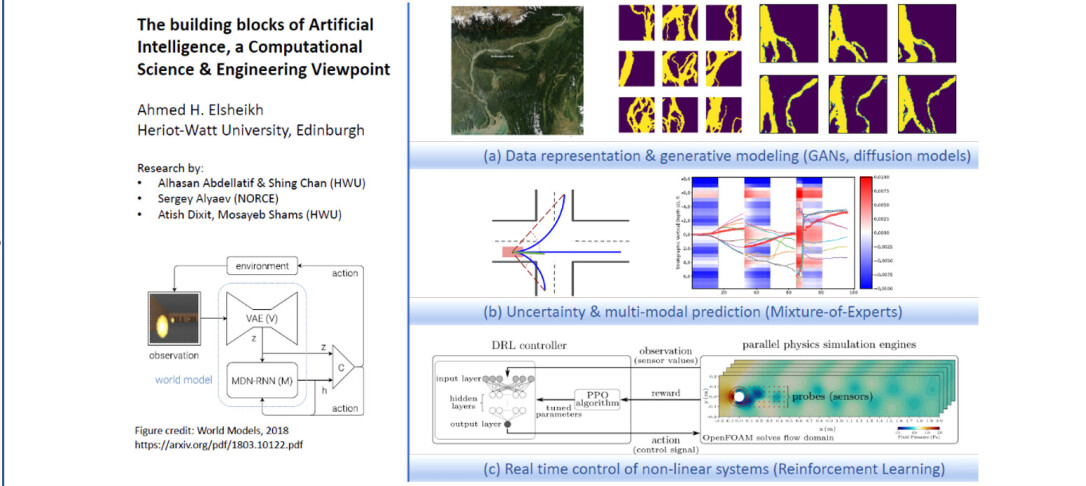
Dr Ahmed Elsheikh will deliver the ESE Departmental Seminar on Thursday the 16th of November 2023: “The building blocks of Artificial Intelligence, a Computational Science & Engineering Viewpoint”.
Join us in room G41 – RSM Building – on Thursday 16th of November 2023 at 12h15.
Abstract
‘In this talk, I will explore foundational elements of AI, including generative modelling, multimodal predictions, and active learning techniques. I will reflect on related contributions from my research group involving the use of generative adversarial networks for geological modelling, multimodal forecasting for real-time decision support, and reinforcement learning for active flow control. I will then draw parallels to cutting-edge performant AI systems like AlphaFold, and ChatGPT. These connections showcase how core AI techniques manifest in real-world advances. I will also discuss challenges in developing AI systems within an academic setting. By examining the building blocks fuelling recent breakthroughs, we can glean insights for advancing AI in a principled manner going forward. My aim is to illuminate practical paths to drive further progress especially in earth sciences and engineering applications.’
About the speaker
 Dr. Ahmed Elsheikh is a Professor at Heriot-Watt University’s Institute of GeoEnergy Engineering. His research focuses on developing and applying artificial intelligence and machine learning techniques to address challenges in subsurface energy applications, including carbon capture and storage. More recently, he developed AI techniques for representation and generation of stochastic fields and for active flow control. Dr. Elsheikh has led multiple high-profile industry-sponsored and government-funded projects applying AI solutions for subsurface engineering. He also directs an active research group and serves as Associate Editor for the journal Computational Geosciences. He recently secured funding from highly competitive UKRI calls including the New Horizons for adventurous, high-risk research in Mathematical Sciences (2021) and Artificial intelligence research to enable UK’s net zero target (2023). Dr. Elsheikh holds a PhD and MSc from McMaster University in Canada. He was previously a Research Fellow at University of Texas at Austin and a Postdoctoral Research Associate at Imperial College London. He received his BSc in Civil Engineering from Al-Azhar University in Egypt.
Dr. Ahmed Elsheikh is a Professor at Heriot-Watt University’s Institute of GeoEnergy Engineering. His research focuses on developing and applying artificial intelligence and machine learning techniques to address challenges in subsurface energy applications, including carbon capture and storage. More recently, he developed AI techniques for representation and generation of stochastic fields and for active flow control. Dr. Elsheikh has led multiple high-profile industry-sponsored and government-funded projects applying AI solutions for subsurface engineering. He also directs an active research group and serves as Associate Editor for the journal Computational Geosciences. He recently secured funding from highly competitive UKRI calls including the New Horizons for adventurous, high-risk research in Mathematical Sciences (2021) and Artificial intelligence research to enable UK’s net zero target (2023). Dr. Elsheikh holds a PhD and MSc from McMaster University in Canada. He was previously a Research Fellow at University of Texas at Austin and a Postdoctoral Research Associate at Imperial College London. He received his BSc in Civil Engineering from Al-Azhar University in Egypt.